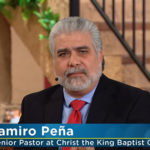CARROLLTON—Racially homogenous churches fall short of the biblical ideal and leave evangelicals in the United States ill-equipped to deal with the reality of cultural pluralism and racial diversity, an Indian pastor in North Texas believes.
In his recently completed doctoral dissertation at Southwestern Baptist Theological Seminary, Sanjay Purushotham, pastor of Asian Indian Baptist Fellowship in Carrollton, explores factors that keep most congregations from becoming multiracial.
Purushotham looks critically at "polycentric" churches—congregations where a sponsoring church and a cluster of smaller ethnic churches operate separately on the same campus.
While that model represents "a significant step forward in recognizing diversity" compared to congregations that make no effort to reach beyond a single race or culture, "it falls short of the unity that Christ calls for," he writes.
Purushotham identifies three major influences that produce single-race churches in the United States—devotion to the church growth movement's teaching about the homogenous unit principle, a consumer-driven view of religion and a tendency to be driven by individualistic cultural preferences.
Purushotham examines the homogenous unit principle promoted by church growth guru Donald McGavran in the 1970s—the idea that people don't want to have to cross racial or ethnic barriers to worship, and churches grow best when they represent a single racial, ethnic or socio-economic group.
He critiques that approach as "anthropologically and sociologically based, having been birthed in a homogenous cultural context, in India, where a rigid caste system existed." He sees the homogenous unit principle as "void of substantial theological reflection" and not reflective of the New Testament ideal.
He believes the homogenous unit principle violates the focus of Christ's Great Commission. "The church growth movement has erroneously propagated methodology that continues to separate God's people on sociological and cultural grounds," he writes. "Jesus has not commissioned the discipling of separate homogenous units. Jesus' disciples are called to make disciples of all peoples everywhere."
Furthermore, Purushotham critiques the way marketing has become the guiding force for many churches, as they seek to compete for the attention of religious consumers.
Sign up for our weekly edition and get all our headlines in your inbox on Thursdays
"A consumer-driven ethos is increasingly overtaking both the membership and leadership in the marketplace of American religion," he writes.
Too many churches equate evangelism with gaining a sizeable market share, he writes. Consequent-ly, they develop strategies for capturing a segment of the market through racially and socially homogenous niche congregations.
"A consumer mentality, rather than a biblical theology, has become the starting point of church growth, leading once again to the formation of churches that are racially homogenous," he writes.
Purushotham also takes issue with the way many churches are shaped by culture and individual preferences, rather than by a vision of Christian unity.
"Many churches start with a parochial view that holds, 'Our way is the only way.' This model views immigrants as 'not really part of us,'" he writes. These churches "are open to people from other cultures to attend their churches as long as they are willing to accept the status quo. No willingness or attempt to reach out to people of other cultures exists. Rather, people from other cultures are expected to become like the dominant culture."
Other churches choose to be culture-specific—perhaps to provide a sense of refuge against the perceived negative influences in the dominant culture or to nurture and promote their own native culture.
Purushotham offers the multiracial model as closer to the spirit of the New Testament. He refers to Jesus' prayer for unity as recorded in John 17 as one biblical mandate for multiracial churches.
In a congregation that includes multiple races and ethnic groups, Christians learn from each other and grow as disciples of Christ, he asserted.
"Multiracial churches can become harbingers of peace and racial reconciliation in a racialized society, good stewards of God-given resources and authentic witnesses in a world which desperately needs the gospel," Purushotham concluded.













We seek to connect God’s story and God’s people around the world. To learn more about God’s story, click here.
Send comments and feedback to Eric Black, our editor. For comments to be published, please specify “letter to the editor.” Maximum length for publication is 300 words.